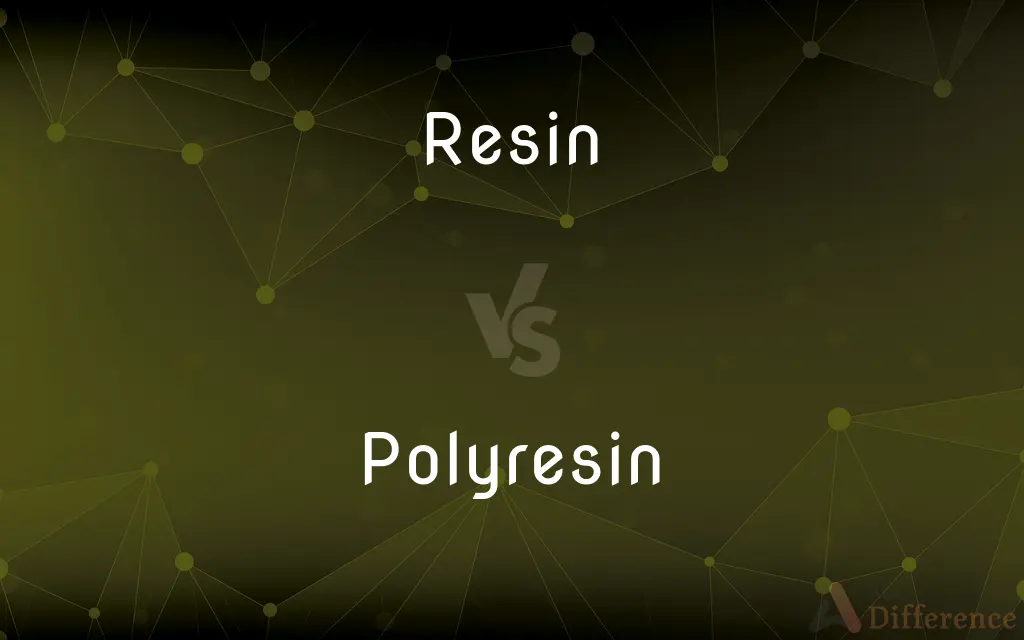Resin vs. Polyresin — What's the Difference?
By Urooj Arif & Maham Liaqat — Updated on April 8, 2024
Resin is a natural or synthetic compound that hardens upon curing, used in various applications, while polyresin is a specific type of synthetic resin, known for its durability and versatility in crafting detailed items.

Difference Between Resin and Polyresin
Table of Contents
ADVERTISEMENT
Key Differences
Resin, in its broadest sense, refers to a diverse group of substances that can be natural or synthetic. Natural resins are organic compounds secreted by plants, notably by coniferous trees, and are used in making varnishes, adhesives, and incense. Synthetic resins, on the other hand, are man-made polymers used in a wide range of products, from plastics and paints to jewelry and sculptures. They are valued for their ability to harden permanently when cured, offering strength, chemical resistance, and insulation.
Polyresin, a subset of synthetic resins, is a specific type of plastic resin known for its rigidity, resistance to wear, and capacity to capture intricate details. It is a composite blend, which often includes a mixture of polyurethane, polycarbonate, and other materials, making it highly versatile for manufacturing decorative items, figurines, and furniture. Polyresin can be molded into a variety of shapes and finished with a painted surface, allowing for a high degree of customization and precision in designs.
The primary distinction between resin and polyresin lies in their scope and composition. While "resin" can refer to any resinous substance, natural or synthetic, "polyresin" specifically denotes a versatile synthetic resin blend used particularly in decorative arts and manufacturing. The versatility of polyresin is attributed to its synthetic nature, enabling it to be engineered for specific qualities such as durability, detail retention, and environmental resistance, which are sought after in commercial and artistic applications.
In terms of applications, resins (especially synthetic ones) play a crucial role in the production of composites, adhesives, coatings, and electronics, where their properties are tailored to meet specific industrial requirements. Polyresin, with its unique characteristics, is predominantly used in the creation of models, statues, and home décor, where fine detail and aesthetic appeal are paramount.
Despite the differences, both natural and synthetic resins, including polyresin, share the fundamental trait of undergoing a chemical reaction that results in a hardened, durable final product. This hardening process, known as curing, is essential to their functionality in both industrial and artistic domains, making them invaluable in their respective applications.
ADVERTISEMENT
Comparison Chart
Nature
Can be natural or synthetic
Specifically synthetic
Composition
Varied; plant secretions or synthetic polymers
Composite blend, often includes polyurethane and polycarbonate
Applications
Varnishes, adhesives, composites, jewelry
Decorative items, figurines, detailed crafts
Characteristics
Hardens upon curing, chemically resistant
Highly durable, captures intricate details, paintable
Use in Arts and Crafts
Broad use in crafting and industrial applications
Specifically favored for detailed and decorative objects
Compare with Definitions
Resin
A hardening substance used in varnishes and adhesives.
Pine resin is used in traditional varnishes.
Polyresin
A durable, synthetic resin used in detailed crafts.
Polyresin is commonly used to manufacture intricate figurines.
Resin
Offers electrical insulation and chemical resistance.
Resin coatings are applied to electronic components for protection.
Polyresin
Ideal for outdoor furniture due to weather resistance.
Outdoor statues made of polyresin resist weathering and UV damage.
Resin
Synthetic resins are crucial in making plastics and composites.
Epoxy resin is popular in jewelry making for its clarity and durability.
Polyresin
Can be painted and colored for custom designs.
Polyresin gifts are often hand-painted for a personal touch.
Resin
Versatile in arts for creating sculptures and coatings.
Artists use resin to encapsulate objects in clear sculptures.
Polyresin
Known for its ability to mimic various textures.
Polyresin items can be finished to look like wood, stone, or metal.
Resin
Natural resins have been used historically as sealants and incense.
Frankincense, a type of resin, is used in incense and perfumes.
Polyresin
Used in home décor for its aesthetic appeal.
Many modern home decorations are made from lightweight, durable polyresin.
Resin
In polymer chemistry and materials science, resin is a solid or highly viscous substance of plant or synthetic origin that is typically convertible into polymers. Resins are usually mixtures of organic compounds.
Polyresin
Any synthetic polymeric resin
Resin
A sticky flammable organic substance, insoluble in water, exuded by some trees and other plants (notably fir and pine)
Clear resin had oozed to the surface, trickled down, and set
Resin
A solid or liquid synthetic organic polymer used as the basis of plastics, adhesives, varnishes, or other products
Epoxy resins frequently cause dermatitis
The chassis is constructed of synthetic resin
Resin
Rub or treat with resin
Resined canvas
Resin
Any of numerous clear to translucent yellow or brown, solid or semisolid, viscous substances of plant origin, such as copal, rosin, and amber, used principally in lacquers, varnishes, inks, adhesives, plastics, and pharmaceuticals. Resins are usually insoluble in water.
Resin
Any of numerous physically similar polymerized synthetics or chemically modified natural resins including thermoplastic materials such as polyvinyl, polystyrene, and polyethylene and thermosetting materials such as polyesters, epoxies, and silicones that are used with fillers, stabilizers, pigments, and other components to form plastics.
Resin
To treat or rub with resin.
Resin
A viscous hydrocarbon secretion of many plants, particularly coniferous trees.
Resin
Any of various yellowish viscous liquids or soft solids of plant origin; used in lacquers, varnishes and many other applications; chemically they are mostly hydrocarbons, often polycyclic.
Resin
Any synthetic compound of similar properties.
Resin
(transitive) To apply resin to.
Resin
Any one of a class of yellowish brown solid inflammable substances, of vegetable origin, which are nonconductors of electricity, have a vitreous fracture, and are soluble in ether, alcohol, and essential oils, but not in water; specif., pine resin (see Rosin).
Resin
Any of various polymeric substance resembling the natural resins[1], prepared synthetically; - they are used, especially in particulate form, in research and industry for their property of specifically absorbing or adsorbing substances of particular types; they are especially useful in separation processes such as chromatography; as, an ion-exchange resin.
Resin
Any of a class of solid or semisolid viscous substances obtained either as exudations from certain plants or prepared by polymerization of simple molecules
Common Curiosities
What is resin?
Resin refers to a natural or synthetic compound that hardens when cured, used in various applications from varnishes to plastics.
Why is polyresin popular in decorative art?
Polyresin's popularity stems from its ability to be molded into detailed, complex shapes and finished with various textures and paints.
How does polyresin differ from other resins?
Polyresin is a specific type of synthetic resin known for its durability and ability to capture intricate details, often used in decorative arts.
What are the primary uses of polyresin?
Polyresin is primarily used in making decorative items, figurines, and furniture that require detail, durability, and aesthetic appeal.
Can resin be natural?
Yes, natural resins are organic substances secreted by plants, particularly by coniferous trees, used historically and in modern applications.
Is polyresin environmentally friendly?
Like many synthetic materials, polyresin's environmental impact depends on its formulation and the lifecycle management of products made from it.
What is the curing process for resin?
The curing process involves a chemical reaction that transforms the resin from a liquid to a solid state, achieving its final strength and durability.
How are resin items manufactured?
Resin items are manufactured by mixing resin with hardeners or other compounds, pouring into molds, and then allowing to cure and harden.
Can both natural and synthetic resins be used in crafting?
Yes, both types of resin are used in crafting, though synthetic resins, including polyresin, are preferred for their versatility and durability.
Are there health concerns associated with handling resin?
Working with certain synthetic resins requires precautions to avoid irritation or adverse health effects from fumes or contact, underscoring the need for proper safety measures.
Share Your Discovery

Previous Comparison
Disseminator vs. Communicator
Next Comparison
Predisposed vs. PredispositionAuthor Spotlight
Written by
Urooj ArifUrooj is a skilled content writer at Ask Difference, known for her exceptional ability to simplify complex topics into engaging and informative content. With a passion for research and a flair for clear, concise writing, she consistently delivers articles that resonate with our diverse audience.
Co-written by
Maham Liaqat














































